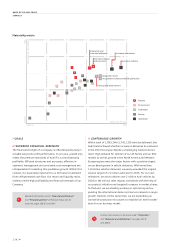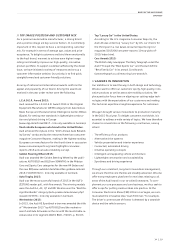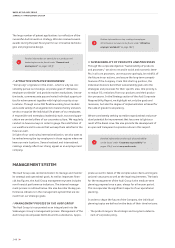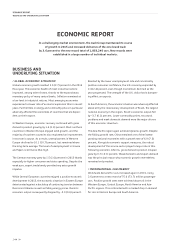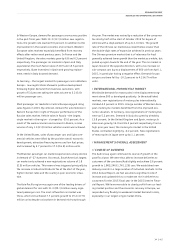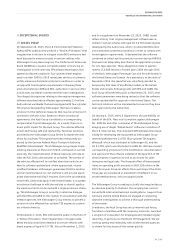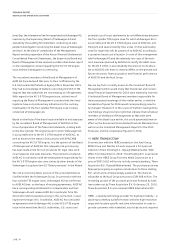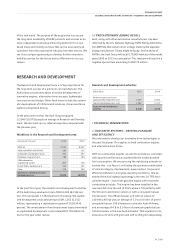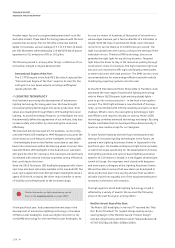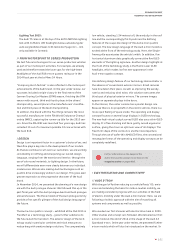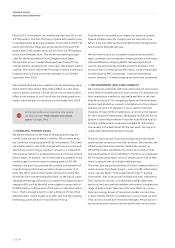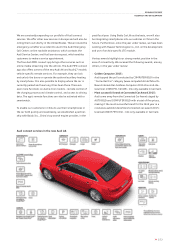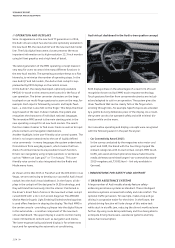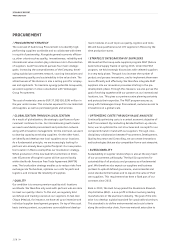Audi 2015 Annual Report Download - page 147
Download and view the complete annual report
Please find page 147 of the 2015 Audi annual report below. You can navigate through the pages in the report by either clicking on the pages listed below, or by using the keyword search tool below to find specific information within the annual report.
ECONOMIC REPORT
BUSINESS AND UNDERLYING SITUATION
>> 147
// EXCEPTIONAL EVENTS
/// DIESEL ISSUE
On September 18, 2015, the U.S. Environmental Protection
Agency (EPA) publicly announced in a “Notice of Violation” that
irregularities in relation to nitrogen oxide (NOx) emissions had
been detected in emissions tests on certain vehicles with
Volkswagen Group diesel engines. The California Air Resources
Board (CARB) also issued a compliance letter announcing an
investigation on the same day. EPA alleged that engine man-
agement software installed in four-cylinder diesel engines
used in certain 2009 to 2015 model year vehicles circumvent-
ed NOx emissions standards under test conditions in order to
comply with homologation requirements. Following these
announcements by CARB and EPA, authorities in various other
jurisdictions worldwide commenced their own investigations.
The alleged discrepancies relating to the engine management
software described above affected approximately 2.4 million
Audi vehicles worldwide that were equipped with four-cylinder
TDI engines developed by Volkswagen. We have created a
provision for the technical measures that may be carried out in
connection with this issue. Based on certain contractual
agreements, the Audi Group is entitled to a corresponding
compensation from Volkswagen AG. As a result, there is no
direct profit impact for the Audi Group. The vehicles affected
remain technically safe and roadworthy. Technical solutions
provided by the Volkswagen Group for the European versions
of the four-cylinder TDI engines have been temporarily ap-
proved by the German Federal Motor Transport Authority
(Kraftfahrt-Bundesamt). The Volkswagen Group began imple-
menting measures at the start of 2016, and based on current
planning, the implementation of these measures will take at
least the full 2016 calendar year to complete. The owners of
the vehicles affected will be notified when their vehicle can
have its software updated and, where appropriate, receive
modified hardware. Volkswagen guarantees that the solution
will be implemented at no cost and that it will provide appro-
priate alternative mobility if required. Due to the considerably
stricter NOx limits that apply in the United States, it is a great-
er technical challenge to refit the vehicles so that all applica-
ble emissions limits can be met with a single emissions strate-
gy. The Volkswagen Group is currently in intensive dialogue
with the EPA and CARB on this matter. In consultation with the
relevant agencies, the Volkswagen Group intends to present a
solution for the affected four-cylinder TDI engines to custom-
ers in North America.
On November 2, 2015, EPA informed the public in the form of
a “Notice of Violation” that irregularities in nitrogen oxide
(NOx) emissions had been detected on certain vehicles with
diesel engines of type V6 3.0 TDI. Also on November 2, 2015,
and in a supplement on November 25, 2015, CARB issued
letters stating that engine management software was in-
stalled in certain vehicles with type V6 3.0 TDI diesel engines
developed by the Audi Group, which circumvented NOx emis-
sions standards under test conditions in order to comply with
homologation requirements. It declared that the software
contained so-called auxiliary emission control devices (AECDs)
that were not adequately described in the application process
for U.S. type approval. These allegations relate to approxi-
mately 113,000 vehicles of model years 2009 through 2016
of the Audi, Volkswagen Passenger Cars and Porsche brands in
the United States and Canada. As a precaution, at the start of
November 2015, the manufacturer voluntarily decided to
temporarily halt sales of all affected models in the United
States and Canada. Following talks with EPA and CARB, the
Audi Group informed the public on November 23, 2015, that
software parameters were being revised so that the software
can be resubmitted for approval in the United States. The
technical solutions will be implemented as soon as they have
been approved by the authorities.
On January 4, 2016, the U.S. Department of Justice (DOJ), on
behalf of the EPA, filed a civil complaint against Volkswagen
AG, AUDI AG and other companies of the Volkswagen Group
alleging use of illegal “defeat device” software in violation of
the U.S. Clean Air Act. The complaint differentiates the respon-
sibility for developing the equipment at Volkswagen Group
internally between the 2.0 TDI (four-cylinder TDI engines
affected), which was attributed to Volkswagen AG, and the
V6 3.0 TDI, which was attributed to AUDI AG. We have created
corresponding provisions for the modification, documentation
and approval of the software installed in the type V6 3.0 TDI
diesel engines in question as well as provisions for sales
measures and legal risks. The financial effect of these special
items on operating profit amounts to EUR 228 million in the
2015 fiscal year. Financial effects that could impact the 2016
fiscal year are considered or presented in the Report on ex-
pected developments, risks and opportunities.
The Volkswagen Group is seeking to clarify the irregularities as
an absolute priority. To that end, the Company has commis-
sioned both internal and external investigations. Lawyers from
Germany and the United States are engaged in conducting
objective investigations to achieve a thorough understanding
of the matter.
In addition, the Audi Group has set up internal task forces,
furnished committees with the necessary resources, launched
a program of cooperation for employees and initiated regular
reporting, in particular to the Board of Management. We are
working openly and intensively with all the relevant agencies
to obtain full disclosure of the matter quickly.



